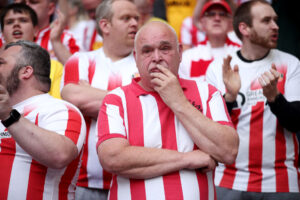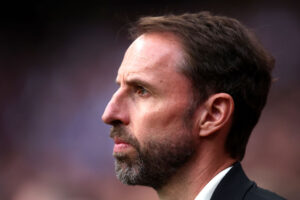First came Carly Zucker, Joe Cole’s fitness instructor girlfriend. Then came a number of other wives and girlfriends as she led them for a run along the canal at the bottom of the park. Behind them was a security team, who themselves were followed by British paparazzi with their foreign colleagues trotting along at the end of the train, eagerly recording the whole circus. This was Baden-Baden during the 2006 World Cup, and Sven-Göran Eriksson’s England at the apogee of the golden generation.
While the players themselves stayed at a remote castle, the WAGs and other family members were billeted at the luxurious Brenners Park Hotel, on one side of which green screens, reminiscent of those they put around stricken horses at the Grand National, were erected so they could sunbathe on the lawns unmolested by the paparazzi. Which meant that when they did venture out, there was a feeding frenzy.
It was unlike any other tournament I’ve covered. On one morning, I went for a run along that path and was almost flattened by a photographer falling out of a tree as he strained for a shot over the screens. At the time, it seemed an entirely mundane occurrence. Every night, after hearing rumours about their location, we’d rush off to see a large group of WAGs at a club or in a bar or dancing on the table at an unsuspecting Italian restaurant, surrounded by their entourages and photographers and reporters, as the well-heeled elderly tourists who comprise much of Baden-Baden’s regular summer population watched on in bemusement. Occasionally, the players would come to visit. Rio Ferdinand pushed in front of me in the queue at a gelateria.
For those journalists fortunate enough to be staying at the Brenners Park — how long ago expense accounts like that seem now — there was a rich harvest to be reaped by hanging around the bar, listening to second-hand accounts of what the players were saying, who was slagging off whom and who was sleeping with whom. It was gossipy, bitchy, enthralling and exhausting. It was the moment when English football definitively became part of celebrity culture, and totally unsuitable for the business of winning a major football tournament. Perhaps in hindsight, even though 9/11 had happened and Iraq had been invaded, there was an air of complacency, everybody high on Germany’s Sommermärchen in the days before the Crash.
England went out in the quarter-final and Eriksson, who died yesterday aged 76, resigned soon after. By then, there was a sense of frustration, a feeling that he had not quite got the most out of a fine group of players cursed by Adam Crozier, the chief executive of the Football Association, with the Golden Generation tag. It felt the off-field activities had become too big a distraction — the affairs, the endless endorsements, the Fake Sheikh sting. Certainly, Eriksson didn’t seem able to deal with the fact that the Golden Generation didn’t really make sense as a team, that one or more needed to be dropped so a less glamorous figure could offer defensive cover, a coherent midfield sacrificed on the altar of celebrity.
But there was no great sense of bitterness. Eriksson was too charming for that. His great strength had been that he didn’t ever seem that bothered by anything, that he treated triumph and defeat alike with a sigh and a drawn-out, “Welllll….” Given his predecessor as England manager Kevin Keegan had tearfully quit in the Wembley toilets after a World Cup qualifying defeat to Germany, such calmness was both welcome and invigorating. What if we treated players like adults? What if management was not about spittle-flecked sergeant-majorly bellowing but about consensus?
Turning to a foreign manager was, effectively, an admission of defeat by England, a recognition the system had failed. Justifiable concerns about whether it was really the done thing for a major footballing nation to appoint a foreigner bled into base xenophobia. Others might have quailed before that. Eriksson shrugged. And it helped, obviously, that he got results.
Towards the end of his first year in the job, in September 2001, 10 days before 9/11, England went to Germany needing a win to have any chance of beating them to the one automatic qualifying slot. Given England had not won in Germany since 1965 and Germany had lost only one of their previous 60 World Cup qualifiers, few gave them much chance. But it was one of those hallucinatory games in which the usual rules seem not to apply. England went behind but then equalised, then took the lead, then kept on scoring, eventually winning 5-1.
Sven, as everybody by then called him, suddenly became a messianic figure who transcended football. Sales of Ericsson mobile phones went through the roof. A 10-year-old boy had his hair cut to resemble Eriksson’s. It took an injury-time David Beckham free-kick against Greece, but England did qualify for the 2002 World Cup ahead of Germany. It was, though, Germany who, having gone through the play-offs, late got through to the final, while England went out to Brazil. Had Beckham not just returned from a fractured metatarsal, might he have made a better fist of stopping the break that led to the equaliser? Perhaps, but Eriksson was never going to drop Beckham.
Yet alongside the celebrity worship, there was a willingness to embrace youth. It was Eriksson who made Wayne Rooney the youngest ever England international before Euro 2004, and until Rooney broke his own metatarsal in the quarter-final, he looked capable of dragging England to glory almost single-handed. As other major names faltered, England looked like potential winners, even if a midfield of Beckham, Steven Gerrard, Frank Lampard and Paul Scholes lacked width on the left, pace on the right and solidity in the middle.
By 2006, in truth, it had all gone a little stale; the porous midfield had become a little too familiar. Eriksson was the first manager to lead England to three successive quarter-finals, but the last was by far the least impressive of them. Treating players like adults, it turned out, led to Baden-Baden. Gareth Southgate’s assessment from the Brazil defeat in 2002 seemed damning: “We needed Churchill but we got Ian Duncan Smith.” England, seeking difference, turned to an Englishman and then to a martinet, but miserable reigns of Steve McClaren and Fabio Capello only served to cast Eriksson’s stint in a rosier light.
To remember only Baden-Baden, though, is to ignore what a great manager Eriksson had been. He was only 30 when, in 1979, he was appointed manager of IFK Gothenburg. He was a revolutionary, heavily influenced by English football and, in particular, by the success of Bobby Houghton with Malmö and Roy Hodgson with Halmstad. It was one thing for English managers to come to Sweden, bin the libero and play with a zonal system, but when a Swede started doing it, it caused an outcry; to some, he may have been too Swedish for England, but he had once been too English for Sweden. One newspaper jokingly printed an advert offering the middle of Gothenburg’s pitch for rent, given Eriksson’s direct style meant it wasn’t much used during games.
But it brought two Swedish Cups and a Uefa Cup — the first European trophy ever won by a Scandinavian club — and earned him a move to Benfica, where he won three Portuguese titles and reached a European Cup final. He capped two decades of success in the club game by leading Lazio to only the second Italian league title in their history. And he did it all with a sense that life was there to be lived and that it wasn’t really worth getting too worked up about anything.
Perhaps the most emblematic story came from Didi Hamann, the German midfielder whose goal at Wembley led to Keegan’s resignation and Eriksson’s appointment. He played under Eriksson at Manchester City and recalled one morning on tour in Thailand in 2008. Everybody knew Eriksson was on his way out of the club and Hamann, considering his own future, was sitting pensively alone on a sunlounger by the hotel pool. He looked up and saw Eriksson approaching, carrying a tray on which sat two glasses of champagne. He handed one to Hamman, who asked what they were celebrating.
Eriksson touched his glass to Hamann’s. “Life, Kaiser,” he said, “Life.”
Disclaimer
Some of the posts we share are controversial and we do not necessarily agree with them in the whole extend. Sometimes we agree with the content or part of it but we do not agree with the narration or language. Nevertheless we find them somehow interesting, valuable and/or informative or we share them, because we strongly believe in freedom of speech, free press and journalism. We strongly encourage you to have a critical approach to all the content, do your own research and analysis to build your own opinion.
We would be glad to have your feedback.
Source: UnHerd Read the original article here: https://unherd.com/



